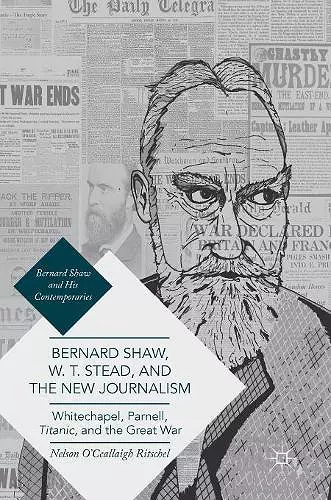Bernard Shaw, W. T. Stead, and the New Journalism
Whitechapel, Parnell, Titanic, and the Great War
Nelson O`Ceallaigh Ritschel author
Format:Hardback
Publisher:Springer International Publishing AG
Published:17th Feb '17
Currently unavailable, and unfortunately no date known when it will be back

"Nelson O'Ceallaigh Ritschel's book on the New Journalism stands as an exemplum for the Shaw and His Contemporaries series, skillfully embedding Bernard Shaw's use and critique of one of the most powerful public developments of the 1880s and beyond." (R. F. Dietrich, Professor Emeritus, University of South Florida, USA, Founding President of the International Shaw Society) "Ritschel's impressive study of Bernard Shaw's journalistic writings provides a nuanced account of the Anglo-Irishman's lifelong commitment to the moral responsibility of language and ideas to address issues of power and class. Reaching beyond orthodox approaches to the dramatist's life and work, Ritschel deftly clarifies the ways in which Shaw's journalism both anticipates and complements our understanding of his dramaturgy, and in doing so constitutes a worthy contribution to Shaw studies, British intellectual and cultural history, and Modernist studies." (Desmond Harding, Professor of English Language and Literature, Central Michigan University, USA)
This book explores Bernard Shaw’s journalism from the mid-1880s through the Great War—a period in which Shaw contributed some of the most powerful and socially relevant journalism the western world has experienced.This book explores Bernard Shaw’s journalism from the mid-1880s through the Great War—a period in which Shaw contributed some of the most powerful and socially relevant journalism the western world has experienced. In approaching Shaw’s journalism, the promoter and abuser of the New Journalism, W. T. Stead, is contrasted to Shaw, as Shaw countered the sensational news copy Stead and his disciples generated. To understand Shaw’s brand of New Journalism, his responses to the popular press’ portrayals of high profile historical crises are examined, while other examples prompting Shaw’s journalism over the period are cited for depth: the 1888 Whitechapel murders, the 1890-91 O’Shea divorce scandal that fell Charles Stewart Parnell, peace crusades within militarism, the catastrophic Titanic sinking, and the Great War. Through Shaw’s journalism that undermined the popular press’ shock efforts that prevented rational thought, Shaw endeavored to promote clear thinking through the immediacy of his critical journalism. Arguably, Shaw saved the free press.
"Shaw is presented to the reader as a voice of reason and rationalism, a man who fights bravely against the tide of his sensationalizing, sex-obsessed contemporaries. … The controversy surrounding Shaw’s article ‘Common Sense about the War’—and his other war journalism—is examined in detail, successfully conveying to the reader a sense of the shockwaves Shaw created with his anti-war stance.” (Helena Goodwyn, Victorian Periodicals Review, Vol. 51 (1), 2018)
“Beautifully written and carefully researched; and display a rare and welcome commitment to social progress. … focus primarily on the non-fictional prose writings of Bernard Shaw, the articles, lengthy letters, public speeches and criticism that form a large and important part of his extraordinary textual production.” (Anthony Roche, Irish Studies Review, Vol. 25, 2017)
“This is an extremely important, meticulously researched, and truly entertaining book on an underexplored topic, and it is an absolute must-read for those interested in Shaw’s journalism, his Irishness, or the intersection between his political crusading and his drama.” (David Clare, SHAW The Journal of Bernard Shaw Studies, Vol. 37 (2), 2017)
ISBN: 9783319490069
Dimensions: unknown
Weight: 4401g
248 pages
1st ed. 2017